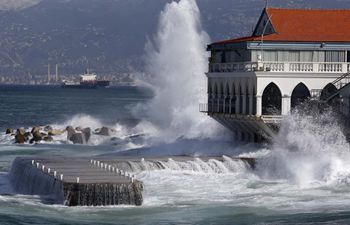BERLIN, Jan. 16 (Xinhua) -- German business associations and economic institutes alike reacted on Wednesday with concern to the British parliament rejection of the withdrawal agreement with the European Union (EU).
"The rejection of the withdrawal agreement is alarming," commented Joachim Lang, director general at Federation of German Industries (BDI), adding that the "the prospect of a chaotic Brexit is dangerously increasing".
The avoidance of a hard Brexit has "top priority now" but the responsibility would lie with the British government and the Labour party opposition in London, according to BDI director Lang.
German companies had "invested in the United Kingdom to the tune of around 120 billion euros (136.7 billion U.S. dollars)" and have considerably more than 2,000 stake holdings in British companies, Lang emphasized.
The German industry would now expect quick answers on how to proceed, as any lack of clarity would "jeopardize tens of thousands of businesses and hundreds of thousands of jobs in Germany, and more particularly in the United Kingdom", the BDI statement read.
The Leibniz Institute for Economic Research (ifo) also warned against a hard Brexit and called on the European Union and the United Kingdom to resume negotiations. "A hard Brexit with its huge costs must be avoided," said ifo president Clemens Fuest.
Ifo trade expert Gabriel Felbermayr considers the rejection of the Brexit deal by the British House of Commons to be understandable "because it would downgrade Britain to the status of a trade colony". Britain would not "stand to gain trade autonomy and its territorial integrity would be called into question," noted Felbermayr.
Similar concerns came from the president of the Kiel Institute for the World Economy (IfW) Dennis Snower, who said that the rejection of the Brexit agreement was a "tragic decision". Snower also believes that an unregulated withdrawal from the EU was highly probable now.
A "no deal" would likely bring trade between the EU and Britain "temporarily to a complete standstill", said Snower. According to the IfW, the British parliament's decision "would only be good if it led to a second referendum."
Unlike most German industry voices, Marcel Fratzscher, president of the German Institute for Economic Research (DIW), thinks that the probability of a hard Brexit on March 29 has barely increased as a result of Wednesday's rejection by the British House of Commons.
Fratzscher expects that either the withdrawal date will be postponed for a few months or that individual agreements for a transitional phase will be reached in order to avoid "economic chaos".
"The rejection of the Brexit agreement, on the other hand, has increased the probability of a second referendum and thus of Britain remaining in the EU," Fratzscher said.
"The Brexit is an economic, social and political disaster for Great Britain. It is hard to imagine another government or party in Europe now wanting to impose such a process on their country," Fratzscher emphasized. "The hope is that politics will now find more courage to reform and advance Europe."













